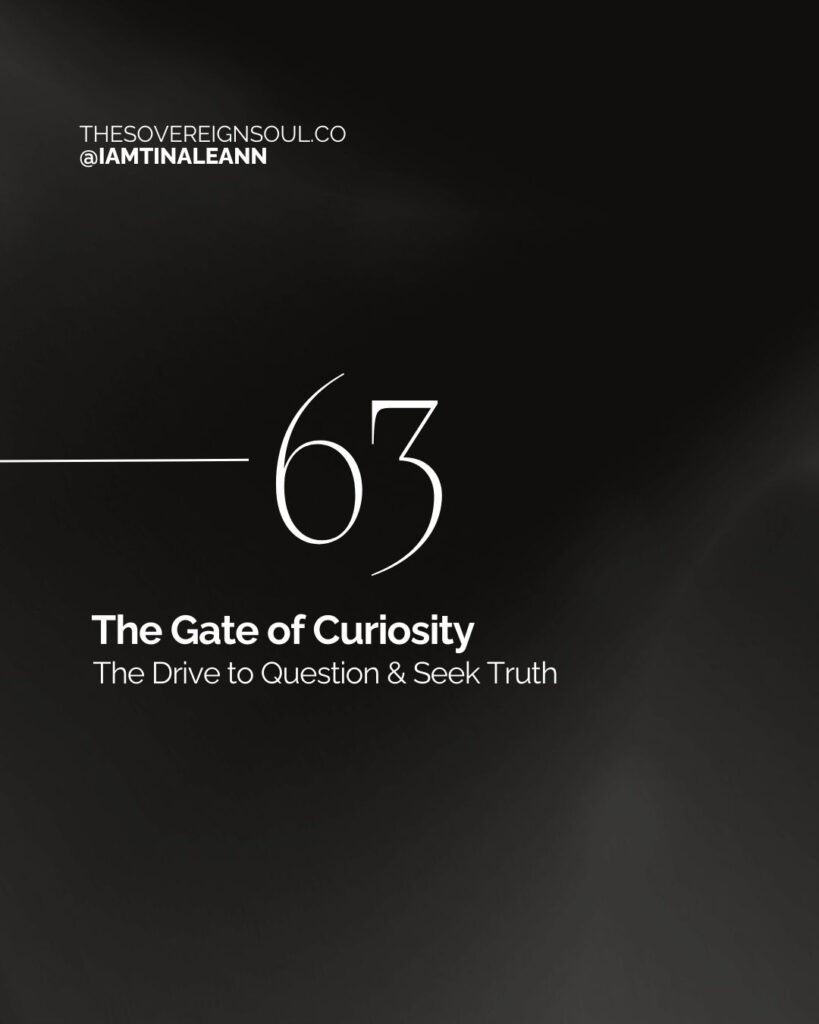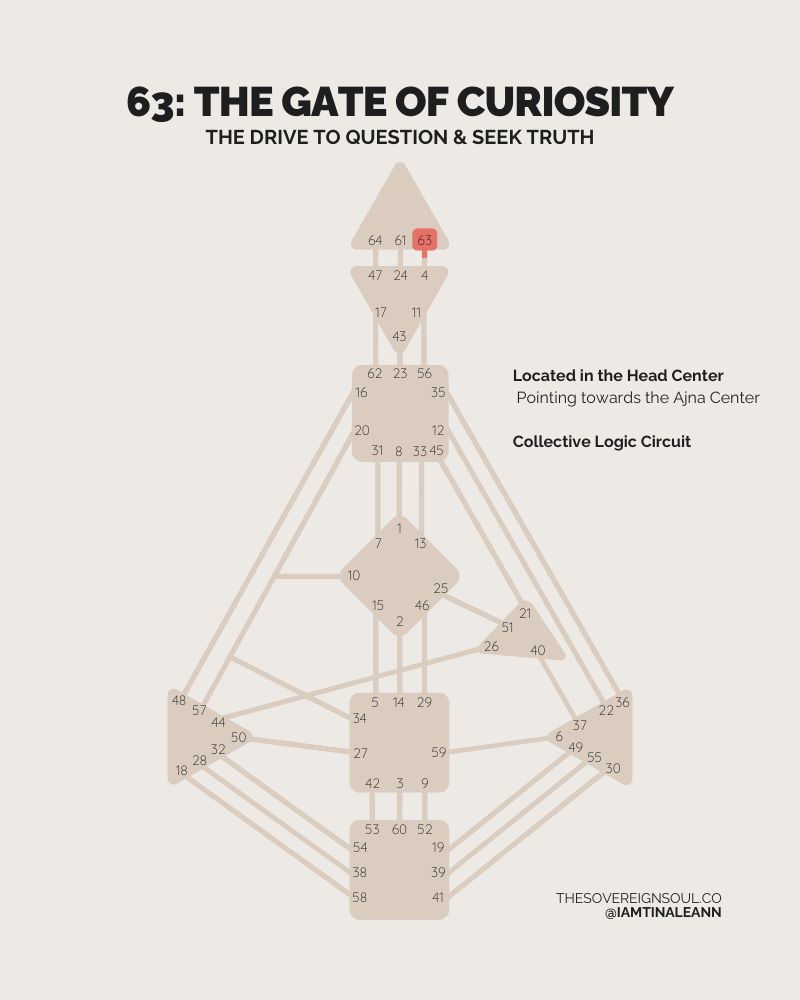Gate 63 in Human Design: The Gate of Doubt – The Drive to Question & Seek Truth
Do you find yourself questioning everything, always searching for deeper understanding? Do you thrive when analyzing patterns, identifying flaws, and ensuring things make logical sense? Have you ever struggled with overthinking or getting stuck in endless doubt?
If so, you might be experiencing the energy of Gate 63 – The Gate of Doubt in Human Design.
This gate is all about skepticism, curiosity, and the drive to test ideas to find reliable truth. People with Gate 63 are designed to ask hard questions, challenge assumptions, and refine knowledge through logical analysis. However, their challenge is learning to trust the process of questioning without becoming overwhelmed by uncertainty.
Let’s explore the analytical, truth-seeking, and logic-driven energy of Gate 63.
What is Gate 63 in Human Design?
Gate 63 is located in the Head Center, which governs mental pressure, inspiration, and the drive to seek answers.
This gate is part of the 63-4 Channel (The Channel of Logic) when connected to Gate 4 (The Gate of Formulating Answers) in the Ajna Center. Together, these gates create a powerful ability to question, analyze, and find logical solutions.
Key Themes of Gate 63:
✅ A natural ability to question, analyze, and refine ideas.
✅ The drive to ensure that logic is sound and trustworthy.
✅ The ability to detect inconsistencies, errors, or missing information.
✅ The challenge of overthinking and getting stuck in mental loops of doubt.
Gate 63 is part of the Collective Understanding Circuit, meaning its energy is focused on improving knowledge and refining logical systems for the benefit of society.
The Energy of Gate 63: Skepticism, Truth-Seeking & Mental Pressure
1. The Gift of Questioning Everything
Gate 63 carries the energy of skepticism and curiosity—when aligned, it can refine and improve knowledge through deep questioning.
🔹 Thrives in problem-solving, research, and testing new ideas.
🔹 Sees flaws and inconsistencies in logic quickly.
🔹 Helps ensure that systems, plans, and ideas are solid before they are accepted.
🔹 Can struggle with feeling mentally overwhelmed by too many questions.
✨ Ask yourself: Am I using doubt as a tool for truth, or am I letting it create unnecessary stress?
2. The Drive to Seek Reliable Truth
Because Gate 63 is rooted in logic, it thrives when it can verify information through patterns and evidence.
🔥 Wants to ensure that knowledge is accurate and trustworthy.
🔥 Feels mentally restless when answers are unclear or inconsistent.
🔥 Works best when allowed time to analyze and process information.
🔥 Can struggle with impatience—wanting certainty when things are still unfolding.
💡 The key to working with Gate 63 is understanding that truth emerges through patience—doubt is part of the process.
✨ Ask yourself: Am I allowing time for clarity to emerge, or am I forcing answers too quickly?
3. The Balance Between Doubt & Trust
People with Gate 63 often struggle with finding balance between questioning and trusting.
💛 They have a brilliant ability to refine ideas but may feel stuck in overanalysis.
💛 They thrive when they embrace curiosity without needing immediate answers.
💛 They need to learn when to stop questioning and trust their conclusions.
💛 They feel most at ease when they understand that doubt is part of learning.
💡 The key to mastering Gate 63 is realizing that doubt is not meant to create fear—it’s meant to refine truth.
✨ Ask yourself: Am I using my mind to improve knowledge, or am I getting stuck in unnecessary overthinking?
The Shadow Side of Gate 63: Overthinking & Mental Exhaustion
Because Gate 63 is meant to question and analyze, it can sometimes lead to:
❌ Getting stuck in loops of doubt—never feeling satisfied with answers.
❌ Overloading the mind with too many questions at once.
❌ Feeling anxious about the unknown, struggling to trust the process.
❌ Dismissing intuition because it isn’t based on pure logic.
💡 The key to mastering Gate 63 is understanding that doubt should refine understanding, not create fear or stress.
✨ Ask yourself: Am I using my doubt wisely, or am I allowing it to drain my energy?
How to Work with Gate 63 Energy
💡 Use Doubt as a Tool, Not a Trap – Questioning is valuable, but don’t let it paralyze you.
💡 Give Yourself Time to Process – Clarity comes with time—trust that answers will emerge.
💡 Find Balance Between Logic & Intuition – Some things can be tested, but not everything needs absolute proof.
💡 Set Boundaries on Mental Overload – Don’t let your mind run in circles—know when to pause.
💡 Share Your Insights with Others – Your questioning mind is a gift—help others refine their thinking too.
Final Thoughts: The Gift of Gate 63
Gate 63 carries the energy of logic, doubt, and the search for truth. It teaches us that:
✅ Doubt is not the enemy—it’s a tool for refining knowledge.
✅ Logical thinking takes time—patience leads to better answers.
✅ Overthinking can be avoided by setting boundaries on mental processing.
✅ Trust is just as important as logic—balance both for true wisdom.
If you have this gate, your ability to analyze, refine, and seek truth is a rare and powerful gift. Honor your curiosity, trust the process of questioning, and remember that doubt leads to clarity when used wisely.
So, the question is: Are you using your logical mind to refine truth, or are you getting stuck in endless doubt?
Feeling this energy? Drop a comment and share how Gate 63 shows up in your life!








